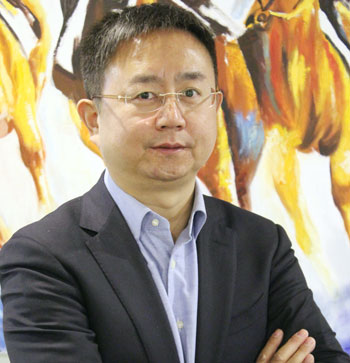“Currently, we have 5,000 3G and 2,700 4G sites, with a subscription base of 6 million and 0.6 million, respectively. In 2016, we will have an additional 2,000 4G sites.Ceo Zong
Federal and provincial governments Taxes squeezed their revenue margins. Ceo Zong
LAHORE (MEDIA REPORT )
Zong CEO Liu Dianfeng hinted at another possible merger in the country’s vibrant telecom sector, saying that Pakistan should ideally have three cellular mobile operators.
Sharing his views on China Mobile Pakistan Limited’s (Zong) future plans, Liu said that it was difficult to generate profits in Pakistan given the size of the market and number of players.
He was referring to the current lot of five players – Zong, Ufone, Mobilink, Warid and Telenor – that compete on tariffs to grab market share.
“It is difficult to make profits in Pakistan’s market and the return on investments comes in different outlines,” Liu told The Express Tribune. “Maybe, in the future, we can think of buying an operator.”
The company, which is the third largest mobile service operator in the country, is currently enduring low margins and is burdened by heavy taxation like all CMOs. Pakistan’s telecom sector faces heavier taxation than its regional counterparts, hindering prospects of growth despite the arrival of 3G, 4G services.
Liu said the parent company’s investment $3 billion, which includes $1 billion for 3G and 4G spectrum licences in 2014, has still not managed to turn things around.
Earlier this year, the company also announced another $400 million investment to upgrade its existing infrastructure, thereby adding more 3G and 4G sites to its network.
“Currently, we have 5,000 3G and 2,700 4G sites, with a subscription base of 6 million and 0.6 million, respectively. In 2016, we will have an additional 2,000 4G sites.
“At the same time, 95% of our 2G sites will be upgraded to 3G and more than 60% will be upgraded to 4G,” he said.
“To develop a 4G market and installing these sites is a big challenge especially when the government is continuously burdening the industry with heavy taxation, the recent example of which is the taxation proposal on smartphone handsets.”
Liu said the company’s main target for the next six years would be to shift half of the total subscriber base to 4G, and 75% to 3G networks. He also expressed his keenness to introduce low price smartphone handsets in Pakistan.
Burden of taxes
The management of Zong, like all other telcos, is uneasy with taxation issues while dealing with federal and provincial governments. This has squeezed their revenue margins, and according to Liu, in 2015 the company paid 41% taxes to the country’s kitty.
In the first quarter of 2016, the situation has become even worse as the company has paid 44% of its revenues to the government
“The government has the right to tax services, but the telecom sector is already suffering from a saturated market,” he said.
“It is difficult for five operators to be profitable in this region, to attract more foreign investment and provide relief the subscriber.”
Currently 20% of company’s revenues come from data bundles and the rest from voice traffic, which has witnessed a decline in 2015.
Liu said that by 2017, they have plans to further increase its data share up to 30%. “Though the data traffic model in Pakistan is slow but we must push this, no one can ignore the internet, it is a business for us and we must accept this.”
“No one knows what is going to happen, but we do know that our data revenues will continue to rise”, he said.
Published in The Express Tribune, May 28th, 2016.

